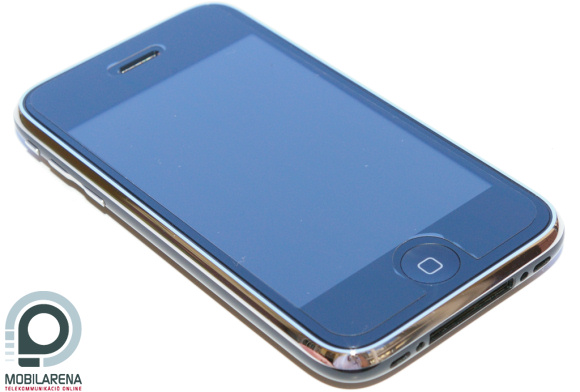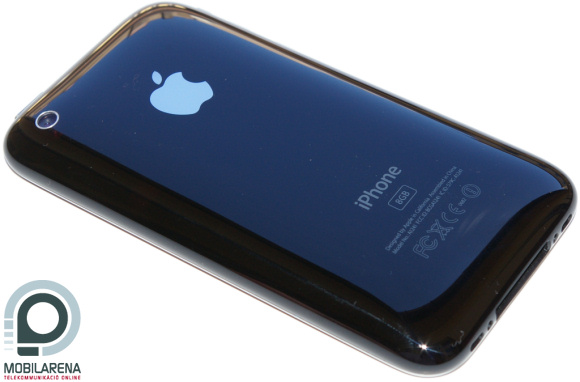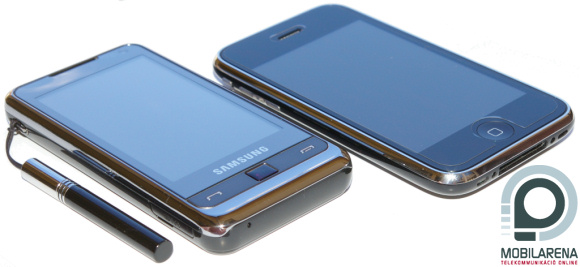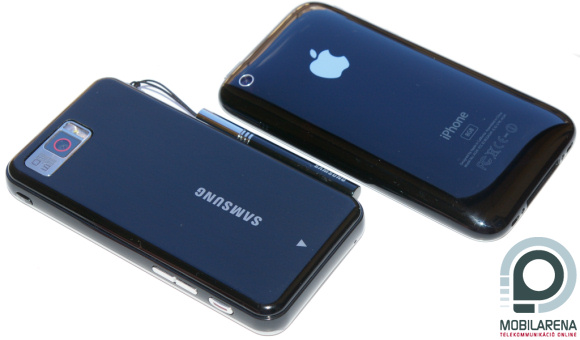Introduction, exterior
Yeah, we know that we have recently posted an iPhone 3G preview and no, we don’t want to unnecessarily hype it, but we have just managed to obtain an unlocked one, thanks to XXL GSM, so we could finally test phone calls, we can write in detail about messaging and data transfer, and we can also discuss the new features of the new, 2.0 software.
If there is a word that telecommunication adepts could kill for, then that’s iPhone. Regarding the preview from last time we have got away, as our editor in chief tried to write an objective article about the latest generation of the Apple phone, and otherwise that has been only a preview. This time, however, it’s my turn and although the subject of the review is the same thing, the conclusion might be a bit different. Of course I will also avoid the usual marketing bullshit, but I will write in more detail about who and why is the iPhone good for…
I’d like to write a few words about the phone’s exterior. Well, from this point of view it didn’t change much, compared to its predecessor, if we take a look at the numbers we can see that it weighs two grams less (that is 133), but it’s thickness and width have increased a couple of millimeters, it’s size is 115.5 x 62.1 x 12.3 mm. The front is almost the same, it’s practically a large display, with a diagonal of 3.5” and a resolution of 320 x 480 pixels. It uses the multitouch system (meaning that it can detect taps in more places at the same time) and it’s image quality is still excellent, it’s really years ahead of the competitors, it’s easy to read even in sunlight.
The back is completely different from what it has been before. On one hand it’s made of plastic, not of metal, and it’s also shiny. And it collects fingerprints. It’s available in two colors, black and white, I think both of them look good, but there are very different opinions regarding this matter too. The volume control keys and the mute button are on the left of the handset, there’s nothing on the right. On top there is the power button and the 3.5 mm jack output, which now accepts all kinds of handsets, not just the factory default one – still, Bog has some kind of headset that somehow didn’t fit (it’s a noname one, that costs cents), but I didn’t have such problems. The bottom has also changed, the handsfree speakers are now not just some simple holes, they have a nice metal “net” covering them and there is a screw near both of them. By the way one of the speakers (the one on the right) is still a “fake”, as only the other one emits sounds, so music is not stereo in handsfree. sztereóban szól.
Phone calls, data transfer
The most important new feature of the handset is that it supports third generation mobile networks. To tell the truth I think that this should have been a feature of the first one too, it’s quite a scam to launch a new phone just for this, but this is how the Apple marketing machinery works. Making phone calls goes the same way, it’s still a pleasant thing to talk on an iPhone, sound quality is really good. Shockingly there’s no video calling, I couldn’t start or receive such a call. The list of default ringtones is really poor, it’s a set of tweets, it’s really as if we had travelled five (or even better: ten) years back in time. Even more, only Mac owners can set MP3 ringtones, which is rather pathetic.


At the time when the first iPhone has been launched we had a great deal of trouble because that didn’t handle contacts on the SIM card. Fortunately this has been corrected by the apple by now, so we can see the magical Import SIM Contacts button on i3G – don’t misunderstand me, I didn’t mention this as a positive thing, as the support for SIM contacts is the most basic feature that a cell phone must know! The contact list now has a separate icon in the menu, but it still can be accessed from the Phone menu. Contacts can have a photo and a ringtone assigned to the, while the other extra fields are as follows: e-mail, web address, mail address, tons of names (like nickname and phonetic name), workplace, birthday, anniversary that can have a unique label, note.


I won’t start praising the web browser called Safari, I will just shortly note that currently this is the most advanced and most usable web browser for mobile devices, it’s much, much better than even Opera Mobile 9.5. Its only flaw is that it has no Flash support, but we are told that Adobe is developing it. Without this I couldn’t access the popular SpeedTest.net website, so I tested the phone’s speed on the Vodafone HSDPA network, using three national sites. I ran the tests three times; the table below has the mean values. As a comparison I have also included the results of my desktop PC (with a Huawei E220 modem).
| HSDPA speed (Vodafone network, Budapest) | ||
| Test site | iPhone 3G | Desktop PC |
| WLA.hu | 911.54 Kbps | 1341.44 Kbps |
| Profinter | 1054.72 Kbps | 1239.04 Kbps |
| Invitel | 716 Kbps | 1159 Kbps |
Although iPhone falls a bit behind the desktop PC, but the results are still great for a cell phone. So web browsing is not just a great experience, but it’s also fast, I liked it. For the sake of owners of unlocked iPhone’s I’d like to mention that the APN setting is not visible in the menu when using a T-Mobile card, so in order to set it up first insert the card of a different network operator, set up T-Mobile’s APN and then insert the T-Mobile SIM. I do not know if this bug is present on other T-Mobile networks or just the Hungarian one, as I had no chance of testing it.
Hirdetés
Messaging and data handling
The first thing I have to note regarded to messaging is the lack of MMS support: shame. It looks like Steve Jobs can only think about the United States, as no one’s interested in multimedia messages over there, but please, iPhone is sold in Europe too! This is also ridiculous as it probably wouldn’t have been a big deal to include it. SMS messages, however, are handled fine, messages are displayed in a chat-like view, and they can be sent to many addressees at once. One thing’s missing over here too: we can’t see how many characters have we typed.


The software still has an email client, and this time we can delete many messages at once. Another great thing is that we have Exchange support, but it’s not that great that the push feature is available only in this case, at Yahoo and MobileMe, but not at other accounts (not even GMail). A few words about MobileMe: this is service from the Macintosh, which has a yearly fee of $99 USD. It helps us to sync our emails, calendar entries, contacts, images between Macs and iPhones and it even has a web interface with a capacity of 20 GB. Although I couldn’t test-drive it, users say that Push Mail is flawless, many talk about the service as a “BlackBerry-killer”, at least regarding speed. Still, there is for example no searching for emails, which is also a strange thing…


The calendar is also new. At the old iPhone, iTunes has just simply united all iCal entries, which has been a problem, as we couldn’t set on the phone which calendar should the new entry go to. There are no such issues now, when using more calendars the entries are color-coded and when defining a new event we can set the destination calendar on the phone.
New features and deficiencies of the 2.0 software
Although there have been a couple of things mentioned about the new features of the iPhone 2.0 software on the previous pages, but that’s not it. For example password entry has been enhanced: when we are typing a secret text the phone won’t put an asterisk in place of the last character until we start typing the next one – this way we can easily observe if we have mistyped something. Another great thing is that we can use many virtual keyboards – of different languages – at the same time and we can switch between them at the press of a button.


The calculator now has scientific functions too, we just have to rotate the phone to access them.


Thanks to the built-in GPS receiver the camera can geo-tag the images. With the new software, applications that use GPS information ask whether they might access the data they want – the problem is that upon starting the camera we always have to answer this question, which is a bit annoying. It’s not a new feature of the 2.0 software, but it’s still worth mentioning that we can freely change the order of the icons in the menu and we can use many pages.


I didn’t yet mention the greatest new feature: we have an App Store! This is a kind of virtual shop where we can download new software. As opposed to general belief there aren’t only commercial programs, if we take a look at the selection (that included about 1000 applications at the moment of writing this review) we can see lots of free ones, but I would had to register in order to use it, so I can only talk about downloading only when the phone becomes officially available at T-Mobile.


It’s important to note that App Store includes only those software that have been approved by the manufacturer. Everyone should decide if this is good or not, but it’s sure that other manufacturers also do this (e.g. RIM), but it will surely be strange for Windows Mobile owners. I personally think that filtered content is a great thing, I have seen software for the Windows Mobile and Symbian platforms that have killed the phone I have installed them on – well we surely won’t see such a thing on the iPhone. We should also note that someone has already bypassed the system and there is an application for $1000 USD that only displays a precious stone on the display. Eight smartass guys have downloaded it until Apple removed it from the store.


That’s about it for the software. We can see that there still are great flaws, lack of MMS and Flash support for example, but I can say a couple of other stuff that would be needed: profile chooser, voice dialing/voice commands, instant messaging software (like MSN), copy-paste feature, ability to work as an HSDPA modem… and of course Bluetooth, that still can be used only for transferring voice, but it doesn’t support the stereo profile (A2DP).
GPS, camera, battery
The new iPhone has GPS, A-GPS to be more precise. It cannot be used for many things yet, we can practically check our current position, which can be good for two things: we can plan a route from somewhere and we can put GPS coordinates on photos. For the first one we can use Google Maps, but that doesn’t support car navigation – TomTom is theoretically developing a navi software, but not much is known about that. Positioning, however, has been lightning fast, iPhone displayed my position in about half a minute, which is quite good.


The camera didn’t change at all: 2 megapixels, fixed focus, no flash. This quality hasn’t been the best a year ago, and now even a low-end Nokia handset has similar features. The number of settings we can alter when taking pictures: zero. We cannot record videos.
The capacity of the battery is unknown, it cannot be changed. Oh, but it can be changed: in a service, for lots of money. I can tell a bit more about uptime: the phone had 4 hours of talk time on 3G network, which is good, very good. It played back videos for more than 6 hours, which is also okay. I couldn’t check music playback time, according to users it takes it for up to 20-30 hours with one charge, of course only if we do nothing else. On the whole I can say that even with a really heavy employment (many hours of music playback, WiFi and 3G web browsing, 1-2 hours of phone calls, lots of other things) it takes it for a day.
Summary
I intentionally don’t write about the musical part as there hasn’t been a bit of a change compared to the predecessor. This is of course no problem, as there simply has been no need for it; the phone is rather good in this term. Of course there still are some deficiencies: the equalizer doesn’t support custom presets, we can’t use a Bluetooth headset and music can be transferred practically only with iTunes, which is okay with me – as an iPod owner – as I like to organize my music, but there are many people who don’t like to tamper with manually editing ID3 tags and downloading album covers. It is evident that Apple didn’t think at all of countries where iTunes Music Store is unavailable.
Summary: the overall image of iPhone is still mixed. On one hand it’s great stuff. It can be denied, but the multi-touch display, the lightning fast and rock stable operating system, the user-friendly design are all great things and then there’s the high-tech feeling, which I think is present only at this handset, or at least in such a manner. On the other hand there is Apple’s business policy that limits users’ freedom: the good operating system is not the only reason why the handset cannot be ruined, but there is also the fact that we can’t access many things. Still, I would like to access, to configure some stuff and I would be happy for the features that are missing. As there are lots of things missing – I don’t write to insert the list again, but I’d like to express my anger regarding some things. Why can I access push email only at Yahoo mail? Why can’t I send an MMS? Why does a manufacturer limit me in such a manner? I will probably never get an answer. Of course I might still become an iPhone owner once, as although it has limited functionality but its features are without any kind of compromise. No award until august 22, as that’s when I get to know the handset’s price with subscription.
Bocha
Translated by Szaszati
Apple iPhone 3G has been provided by XXL GSM. Their address is:
Budapest VI. Jókai tér 6.
Budapest VI. Teréz körút 18.
The on-line store can be accessed at this address :www.xxlgsm.hu.
Specifications
| Apple iPhone 3G | ||
 | General | |
| Technology | GSM/UMTS | |
| Size | 115.5 x 62.1 x 12.3 mm | |
| Weight | 133 grams | |
| Available colors | Black, white | |
| Display | ||
| Display diagonal | 3.5” | |
| Display resolution | 320 x 480 pixels | |
| Display type | TFT | |
| Number of colors | 16 million | |
| Memory | ||
| Phonebook capacity | n.a. | |
| SMS memory / max. MMS size | n.a. / not supported | |
| Internal memory | 8 / 16 GB | |
| Memory expandability | not expandable | |
| Data transfer | ||
| Frequency bands | GSM 850/900/1800/1900 MHz UMTS 850/1900/2100 MHz | |
| GPRS / EDGE | present / present | |
| UMTS / HSDPA | present / present (3.6 Mbps) | |
| IrDA / Bluetooth | none / 2.0 (only headset support) | |
| WiFi | 802.11b/g | |
| USB | 2.0 (proprietary Apple connector) | |
| Push-to-talk / RSS | none / none | |
| GPS receiver | present (A-GPS) | |
| Basic functions | ||
| Profiles | none | |
| Vibra function | present | |
| Built-in handsfree | present | |
| Voice dialing / voice commands | none / none | |
| Sound recorder | none | |
| Alarm clock | present | |
| Predictive text entry | present | |
| Software | ||
| Platform | iPhone | |
| WAP / HTML browser | present / present (Safari browser) | |
| E-mail client | present (POP3, IMAP4, authenticated) | |
| Java | none | |
| Games | downloadable, none included | |
| Currency converter | none | |
| Extra software | iPod, Safari, Google Maps, YouTube, iTunes, Apple Store, scientific calculator, weather forecast | |
| Multimedia | ||
| Main camera | 2 megapixels, fixed focus | |
| Secondary camera | none | |
| Video recording | none | |
| Music player | present, can run in background | |
| Equalizer | present (no custom presets) | |
| FM radio | none | |
| Battery | ||
| Main battery | unknown capacity, not user-changeable | |
| Standby time | 300 hours | |
| Talk time | 600 minutes | |
| Other | ||
| Multitouch touchscreen, TV-out, gyroscope | ||



















